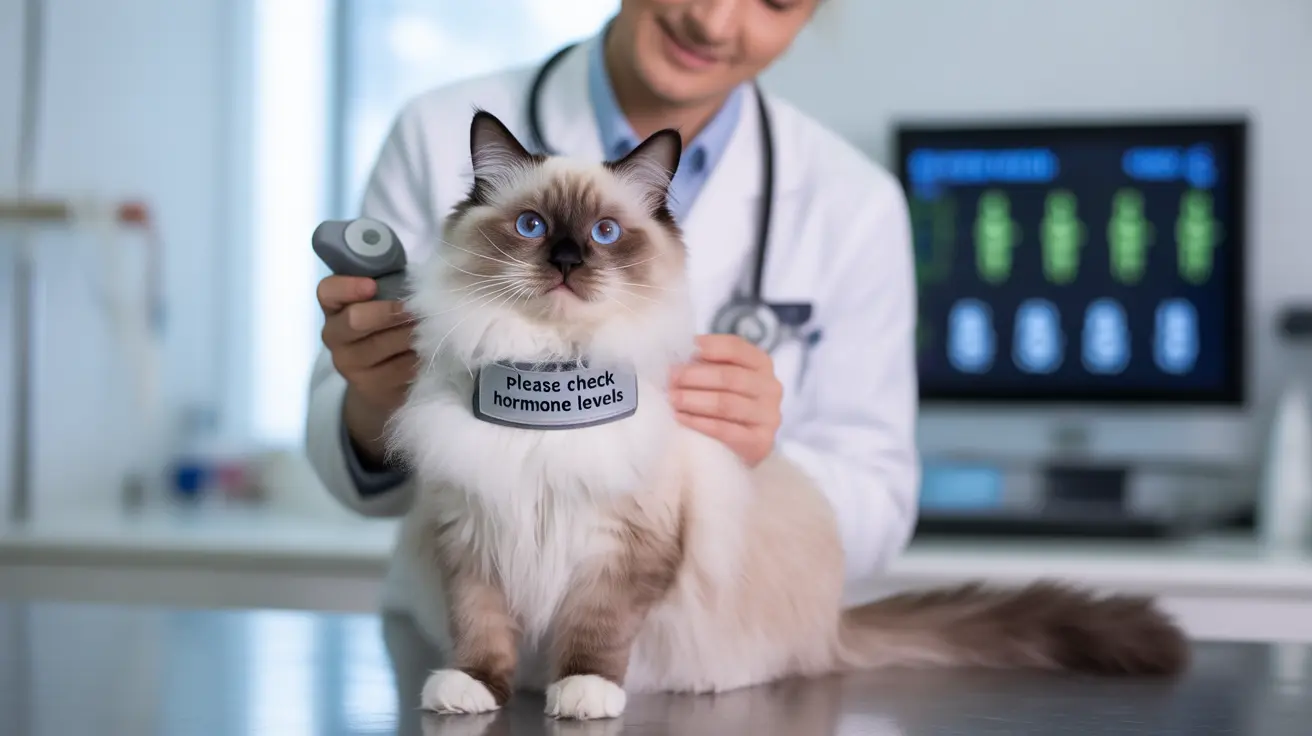The Basics of Cat Hormones
Cats possess an intricate endocrine system that produces various hormones through specialized glands throughout their bodies. These hormones act as chemical messengers, traveling through the bloodstream to regulate vital bodily functions, including:
- Growth and development
- Metabolism and energy regulation
- Reproductive cycles
- Stress response
- Mood and behavior
- Blood sugar control
Key Hormones in Cats and Their Functions
Growth and Metabolism Hormones
The pituitary gland produces growth hormone, which controls development and cell reproduction. Meanwhile, the thyroid gland releases thyroxine and triiodothyronine, which regulate metabolism and energy use throughout the body.
Stress and Emergency Response Hormones
The adrenal glands produce cortisol and adrenaline, which help cats respond to stress and danger. These hormones trigger the "fight or flight" response, increasing heart rate and preparing the body for action.
Reproductive Hormones
Female cats produce estrogen and progesterone in their ovaries, controlling breeding cycles and maternal behavior. Male cats produce testosterone in their testes, which influences territorial marking, aggression, and mating behaviors.
Common Hormonal Issues in Cats
Hyperthyroidism
This condition occurs when the thyroid gland produces too much hormone, leading to weight loss despite increased appetite, hyperactivity, and excessive thirst. It's particularly common in older cats.
Diabetes
When the pancreas doesn't produce enough insulin or the body becomes resistant to it, cats can develop diabetes. Signs include increased thirst, frequent urination, and weight changes.
Effects of Spaying and Neutering
When cats are spayed or neutered, it significantly affects their hormone levels. This usually results in:
- Reduced territorial marking
- Decreased aggression
- Lower risk of certain cancers
- Potential weight gain due to metabolic changes
Signs of Hormonal Imbalances
Watch for these common indicators of hormone-related issues:
- Sudden changes in appetite or thirst
- Unexplained weight loss or gain
- Changes in energy levels
- Unusual aggression or behavior changes
- Skin or coat problems
Frequently Asked Questions
What hormones do cats have, and what roles do they play in their health and behavior?
Cats have multiple hormones including insulin, thyroid hormones, cortisol, adrenaline, and reproductive hormones. These regulate metabolism, stress response, growth, and reproductive behaviors.
How do testosterone and estrogen affect male and female cat behaviors?
Testosterone in males influences territorial marking, aggression, and mating behavior. Estrogen in females controls breeding cycles, maternal instincts, and reproductive behaviors.
What are the common hormonal diseases in cats, and what symptoms should owners watch for?
Common hormonal diseases include hyperthyroidism and diabetes. Watch for changes in appetite, weight, thirst, urination patterns, and energy levels.
How does neutering affect a cat's hormone levels and behavior?
Neutering reduces sex hormone levels, leading to decreased territorial marking, aggression, and roaming behaviors. It may also affect metabolism and appetite.
How is hyperthyroidism diagnosed and treated in cats?
Hyperthyroidism is diagnosed through blood tests measuring thyroid hormone levels. Treatment options include medication, radioactive iodine therapy, or surgery.
Conclusion
Understanding cat hormones is crucial for maintaining your pet's health and well-being. Regular veterinary check-ups can help detect hormonal imbalances early, ensuring your cat lives a healthy, balanced life. If you notice any unusual changes in your cat's behavior or physical condition, consult with your veterinarian to rule out hormone-related issues.






